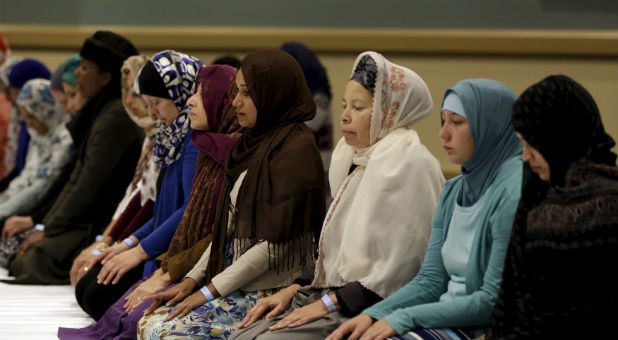I am asked a lot of questions.
My personal favorites are when people inquire, “What are you?” and “But where are you really from?”
As an ethnically ambiguous person, I am frequently mistaken for various races and ethnicities. I was born in Dallas, Texas, and my parents were born in Cairo, Egypt. I have spent virtually my entire life addressing misconceptions about culture (Camels are not our preferred mode of transportation), the Middle East (I do have rights!), Islam (I don’t wear a hijab, but yes, I am Muslim), and countless others.
Lately, the myths about Islam have been my biggest battles. I am a simple person who likes rap, tacos, and happens to be Muslim. The world, however, sees me differently. People don’t hear about Muslims who rhyme or enjoy barbacoa; they hear the news.
In the news, Muslims are not humanized by stories; we are explained through statistics. We are discussed primarily in the context of terrorism, and in conversations about extremism. When a headline deems a Muslim responsible for an atrocity, I am expected to speak out against actions that in no way represent me, or anyone like me. My existence should not be used in juxtaposition to violence. I am not your contrast to terrorism. I am not your example of a “good” Muslim, rather I am in the vast majority. What you see on TV, the narrative you are fed, is the anomaly.
People often tell me that I am the only Muslim person they know, or the first Muslim they have met. They point to me when explaining that not all Muslims are terrorists. “I saw what happened in news, but do you know my friend, Nelly? She’s not like that…”
Regardless of their understanding that I am not public enemy #1, I do not want to be anyone’s only experience of a Muslim, a mouthpiece for an entire, extremely large and diverse, group. I am one voice. I am not a perfect Muslim, nor am I a religious scholar. I am a person who happens to be Muslim, and there are millions more of us, each person different than the next. I also do not want to be someone’s only experience, because it leaves people at a disadvantage. If I am someone’s only experience, then he or she is missing out on a huge, diverse, beautiful group of people who come from rich cultures and varied backgrounds. There are Muslims way cooler than I am; go meet them too.

In general, I am happy to talk, listen, and answer questions. I recognize that much of this comes from a good place, and I acknowledge that the majority of people are genuinely trying to understand, working to get a better sense of what the world is like on the other side. The problem begins when I have to be the only voice, because when you are the only, you become attached to one specific identifier.
The issue I have with being tokenized is that once you are labeled by a specific identity, everything you do is scrutinized against the framework of that identity. Who I am as a person becomes solely hinged upon one piece of a much larger puzzle. I do not label people as my white co-worker, my Jewish doctor, or my Chinese friend. This is because our identities are far more complex. Unfortunately, this idea does not always transfer to marginalized groups. Muslims who are everyday citizens become the exception to terrorism. Everyday citizens who are Black, Mexican, you name it, become the exception to stereotypes rather than the individual people they live their lives to be.
There is a difference between choosing to share your story, and being obligated to do so because no one else will. That is what it is like most days, I feel like I have to speak out, because otherwise, the narrative about Muslims stays the same. But the needle does not move closer to progress. Nothing changes, and there is no advancement.
After Trump won the election, many people were alarmed by the number of closet racists who exist. People learned that a racist could look like your high school history teacher or the person who delivers your mail. This left members of minority groups especially afraid, and I still remember wondering to myself, when things hit the fan, who will truly be there for me? Who will actually speak out for people like me or anyone who is targeted? There are those who say they will, and I want to believe them, but, to borrow a phrase I heard at a recent conference, “We don’t need noun allies; we need verb allies.”
Dear world: Don’t underestimate the power of your voice. You are equally responsible for changing the narrative. This is not an opportunity that falls solely on the oppressed, rather this is a collective obligation. Listen to the stories of others, and use your voice to amplify other voices. Help create a space for different people to be in the conversation, and look for the voices that are missing from the dialogue and make sure they have a chance to be heard. Many of us have been shouting for so long that our voices are hoarse; our throats are sore. I want to hear your voice, too. I want to see you engaged in the process, to walk alongside those who march. Call out someone who makes a racist or xenophobic remark; attend an inter-faith panel to learn more. – put action behind those hashtags.
It shouldn’t be my responsibility to convince people to care about each other, I don’t have a simple solution on to how to educate people to be invested, even when they are not personally connected to something. I do have a starting point though: we can begin to change the narrative by making an effort to meet people who are different from us. We have to build relationships with those we do not understand, to discover authentic representations of marginalized groups of people.
Nigerian writer Chimamanda Ngozi Adichie gave the TED talk “The Danger of a Single Story” (below) in which she discussed the trouble with generalizing people based on one narrative. She asserts that the issue with stereotypes is not their validity. Whether or not stereotypes are true is secondary to the fact that they are incomplete. We are never able to know the whole person, and we cannot accept the single story. She explains, “When we reject the single story, when we realize that there is never a single story about any place, we regain a kind of paradise.”
You can help change the narrative. Somewhere in between the questions “What are you?” and “But where are you really from?” lies understanding. Ask questions that will allow you to get to know people as individuals, independent of their identifiers or perceived identity. You may ask the wrong questions sometimes, but that is okay – know that what you choose to do after that, whether you learn from that experience, is what matters. Rewriting the narrative takes everyone, stepping outside your comfort zone to extend a hand to others takes courage, and gives much more. It builds bridges, transforms lives, and if you are lucky, leads to rap and tacos.
By Nelly Kaakaty





